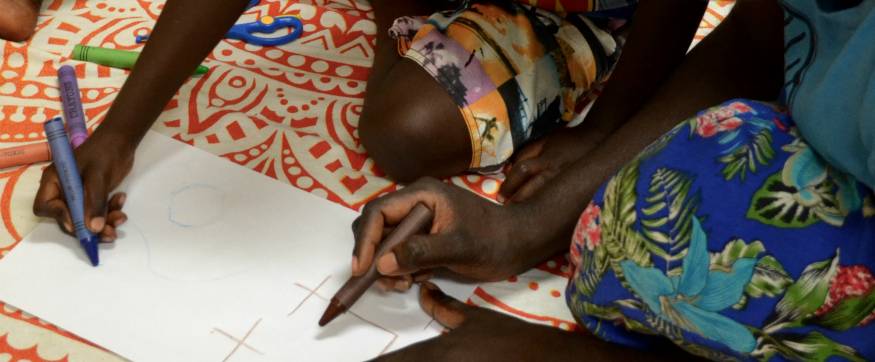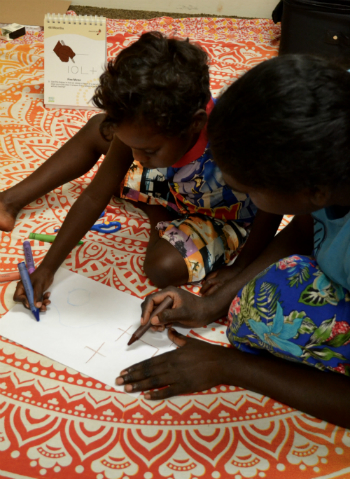
Measuring Indigenous childhood development in remote Australia
Research 21 Feb 2017 5 minute readThrough its involvement in the Science of Learning Research Centre, ACER is supporting research to investigate the accuracy of a tool that measures the developmental status of young children in remote Indigenous Australian contexts.
A study led by Melbourne Graduate School of Education PhD candidate Samantha Simpson suggests a new developmental screening tool adapted for use in the remote Indigenous Australian context is fit for purpose. The research study was carried out with support from Melbourne University Professor Collette Tayler and ACER Research Director Dr Siek Toon Khoo, who are both Chief Investigators of the Science of Learning Research Centre, together with Dr Anita D’Aprano of Melbourne University and Roxanne Highfold of the Central Australian Aboriginal Congress.
Initial results from the study, which commenced in 2016, were published in the journal Early Human Development in December.
According to Ms Simpson and her co-authors, early identification of developmental delay and targeted early childhood interventions can make a significant and enduring positive impact on a child’s health and wellbeing. In contrast, the later problems are identified, the more difficult they are to address.
The authors explain that, because a clinical assessment of a child’s developmental status is relatively time-consuming and costly, children’s development is commonly assessed through the use of a parent-completed, structured developmental screening tool in the presence of an early childhood health care professional or educator; however, a suitable tool is not always available for all contexts.
‘There are currently no developmental screening instruments validated for use in the Australian Aboriginal context,’ the authors write.
‘The use of culturally inappropriate tools can lead to unreliable results with serious negative consequences, such as over- and under-recognition of children with developmental difficulties, services introduced too late or not at all, and undermining Aboriginal language and cultural goals.’
The study sought to address this gap by investigating the suitability of a developmental screening tool that was recently adapted culturally and linguistically for use in the remote Indigenous Australian context. Based on the widely used Ages and Stages Questionnaire, 3rd Edition (ASQ-3), the Indigenous Australian adaption – ASQ-TRAK – is shorter in length, written in modified English, and includes modifications to make items more culturally appropriate for Indigenous children.
In order to determine the ASQ-TRAK’s suitability in Indigenous contexts, the study compared children’s performance on the ASQ-TRAK with results on a standardised, professionally administered developmental assessment. The Bayley Scales of Infant and Toddler Development, 3rd Edition (Bayley-III) was chosen for comparison because it is the most widely used standardised assessment of infant development and has been used in similar studies of the ASQ-3. Both the ASQ-3 and the Bayley-III measure communication, gross motor skills, fine motor skills, problem solving and social development; however, social development was not a focus of this study.
The study was conducted in Alice Springs over a 28 week period during 2016 at the Aboriginal community controlled primary health care service, the Central Australian Aboriginal Congress. Children eligible to take the ASQ-TRAK questionnaires designed for ages two, six, 12, 18, 24 or 36 months were identified through clinic records and their parents or caregivers approached to participate in the study.
Child health nurses employed at Congress administered the ASQ-TRAK to participating children. The Bayley-III was then administered within the following week by a qualified practitioner with no knowledge of the child’s ASQ-TRAK results. In total, 67 children completed both the ASQ-TRAK and the Bayley-III.
 Early results suggest that the ASQ-TRAK has acceptable characteristics for use as a developmental screening instrument for remote Indigenous children aged between two and 36 months. There was a moderate correspondence between scores in the communication, gross motor, fine motor and problem-solving domains on the ASQ-TRAK and Bayley-III, suggesting that most children who score well on the ASQ-TRAK are developing typically.
Early results suggest that the ASQ-TRAK has acceptable characteristics for use as a developmental screening instrument for remote Indigenous children aged between two and 36 months. There was a moderate correspondence between scores in the communication, gross motor, fine motor and problem-solving domains on the ASQ-TRAK and Bayley-III, suggesting that most children who score well on the ASQ-TRAK are developing typically.
There was, however, a modest over-referral rate of children by ASQ-TRAK, with seven per cent of those who were identified as having developmental difficulties by ASQ-TRAK later identified as developing typically on the Bayley-III. Conversely, only three per cent of children who scored well on the ASQ-TRAK were identified by the Bayley-III as having developmental delay.
The authors note that, while the study’s findings are limited by the small number of participants, it remains a first in the remote Indigenous context and further research to collect additional data from other remote locations around Australia is planned.
‘Despite the challenging nature of this research, it is critical to continue the validation study so that the ASQ-TRAK can be used with confidence,’ the authors write.
Read the full report:
‘Validation of a culturally adapted developmental screening tool for Australian Aboriginal children: Early findings and next steps’, by Samantha Simpson, Anita D'Aprano, Collette Tayler, Siek Toon Khoo and Roxanne Highfold, was published in the journal, Early Human Development, Vol. 103, December 2016.
An individual or institutional subscription to ScienceDirect is required to download the full article.
